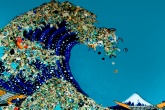Eunomia to lead study on ocean microplastics
Environmental consultancy Eunomia Research & Consulting has been appointed by the European Commission to run a study investigating how to reduce the effects of microplastics escaping into the oceans.
 Eunomia, in partnership with consultancy ICF, will lead the study, measuring the losses of microplastics from various sources and exploring ways to reduce the impact on the ocean environment. The consultancy has previously conducted research into the sources of marine plastic pollution and its effects on the environment.
Eunomia, in partnership with consultancy ICF, will lead the study, measuring the losses of microplastics from various sources and exploring ways to reduce the impact on the ocean environment. The consultancy has previously conducted research into the sources of marine plastic pollution and its effects on the environment.
The study will be focusing on microplastics emitted from, but not intentionally added to products such as textiles, vehicle tyres and artificial sports pitches. It will also look at the loss of pre-production plastic pellets, featured in two of Eunomia’s recent studies for environmental charity Fidra. A sister study will be conducted to focus on products that contain ‘intentionally added’ microplastics, such as cosmetics that use microplastics as exfoliants. Together, the studies will contribute to the commission’s plastics strategy, due later this year.
The study will also look at the impact of microplastics on human health and the food chain. A study published for the Convention on Biological Diversity found that around 35 per cent of fish have microplastics in their stomachs. While some fish can excrete plastic, others cannot, causing it to accumulate in their bodies.
In June, a public consultation will be held, followed by a workshop in Brussels in July. A range of stakeholders will be invited to participate, including retailers, manufacturers, trade associations, non-governmental organisations and consumers. Feedback will be incorporated to ensure recommended measures are ‘realistic, cost effective and coherent’ with other environmental policy goals, focusing largely on reducing microplastic emissions at source. The final report is due to be presented in November 2017.
‘Action needs to be taken’
Chris Sherrington, Principal Consultant and Director of the project said: “We’re very pleased to be leading this important work for the European Commission. The issue of microplastics in the aquatic environment, and indeed the terrestrial environment, is now attracting serious attention from the public and policymakers alike. Scientific understanding of the impacts is developing rapidly, but remains far from complete. However, it is clear that action needs to be taken to reduce the amount of plastic entering the environment each year. It’s thus important that all potential measures are considered in the light of the best available evidence, in order to achieve improved environmental outcomes in the most cost-effective and equitable way.”
Last year, Parliament’s green watchdog, the Environmental Audit Committee (EAC), published a report on the environmental impact of microplastics, prompting the UK government to announce plans to ban the sale and manufacture of products containing microbeads.
More information on the study can be found on the project website. For more on the effects of plastic in the marine food web, see Resource’s previous article.







